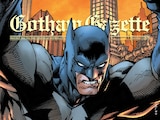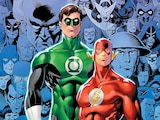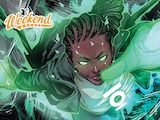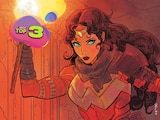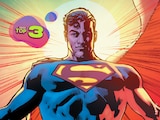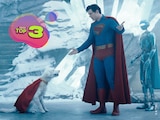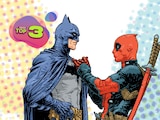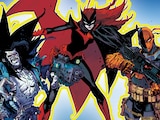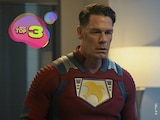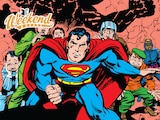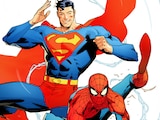With the frankly delightful news that James Gunn and Peter Safran's plan for the first chapter of their new DC Universe ends with a starring role for Swamp Thing, this Halloween season is the perfect time for new fans to get to know DC's most gothic hero. Gunn has stated the film will be a horror story and posted the cover of a very beloved Swamp Thing run as inspiration. So, in this week's House of List-ery, we've curated a selection of some of the most influential and haunting Swamp Thing horror stories. Turn down the lights, grab a steaming hot cup of your favorite warm beverage and get ready to get up close and personal with the spirit of the swamp.

House of Secrets #92 (1971)
It was this gothic tragedy that sparked the legend of Swamp Thing.
Creators Len Wein and Bernie Wrightson teamed up to tell a heartbreaking story about a man named Alex Olsen. After a shocking accident in his lab, Alex was assumed dead, leaving his beloved wife alone at the hands of a cruel new husband. However, Alex had been transformed into something more than human, a lumbering creature of the swamp who wants nothing more than to be reunited with the woman that he loves.
Wrightson's perfectly eerie art and Wein's romantic sensibilities established the tone and emotional throughline that would continue to be the beating heart of Swamp Thing stories for years to come. And when the pair were given the chance to expand the gothic fable, they took Swamp Thing to new heights in his very first solo series…

Swamp Thing (1972)
Yes, less than a year after his debut, Swamp Thing got his own title with a reimagined backstory and new name. This is where fans met Alec Holland, a contemporary scientist in Louisiana aiming to make a formula that'll bring trees and lush overgrowth to the desert.
Just like in his debut, we meet Swamp Thing after his horrific accident, looking over the woman and home that he loves but can never return to. Keeping his origin relatively similar, here Alec and his lab are purposefully targeted, setting him up for his horrific new fate.
There is nothing quite like the Gothic adventures of the newly transformed Alec Holland. Wrightson understands horror innately and, teamed with Wein, delivers something truly special that feels like a vibrant genre story, but it's one that is always anchored by the humanity of the monster at its core. Far from your traditional superhero comic, this is a gorgeous and terrifying tale of love and loss.

The Saga of the Swamp Thing (1984)
This revamped Swamp Thing series began as a way to engage readers who had seen Wes Craven's 1982 movie about the titular monster. But it would go on to become a radical reinvention of the character—and eventually, a timeless DC classic—when the series was taken over by Alan Moore, who joined the book at issue #20 alongside Dan Day, killing Swamp Thing in a hail of bullets. However, it was the next issue that would change everything when Moore joined series artists Stephen R. Bissette and John Totleben in "The Anatomy Lesson."
Moore resurrected the hero in a dynamic feat of science fiction and revealed a horrifying truth: Alec Holland died in the swamps of Louisiana years ago, and the Swamp Thing is nothing more than organic plant matter that took on his memories thanks to the magic of the Green (the mystical force that connects all plant life within the DC Universe). It was a huge twist that recontextualized the character and established Moore, Bissette and Totleben as a daring team.
This series showcases that at every step including the incredible issue titled "Rite of Spring," which gave us one of the most romantic, trippy and strange entries into DC Comics history.

Swamp Thing (1991)
Southern Gothic novelist Nancy A. Collins took on the monstrous hero in the early '90s in an underrated and rather radical take that ran from Swamp Thing #110-139. Alongside a selection of artists like Tom Mandrake, Tom Yeates, Jan Duursema, Kim DeMulder and even Mike Mignola, Collins crafted a dramatically different Swamp Thing that still felt true to Moore and Bissette's beloved run.
This is a politically-minded story that traverses the waters of murder mystery, an unexpected run for office, and—at its heart—the Swamp Thing family. Collins is deeply concerned about Swamp Thing and his love for Abby Arcane and their powerful daughter Tefe, adding another human element to the kindhearted monster. That doesn't mean this is a soft story, though, Collins pulls no punches in this engaging and righteous tale, which was recently collected as a trade paperback for the very first time since its original release.

The Swamp Thing (2021)
While Ram V and Mike Perkins introduce a new Swamp Thing in this series, Levi Kamei—and DC Studios’ upcoming adaptation will likely focus on Alec Holland—it's impossible not to highlight this gruesome neo-noir when discussing essential Swamp Thing horror titles.
After visiting his parents in India, Levi becomes entangled with the Green, taking on its power and its mantle. In every sense, this feels like a classic Vertigo title, despite being a mainline book, so if you're a fan of DC's darker side, this is a perfect pick-up for you. In its metaphysical exploration of the nature of Swamp Thing and the Green, the team continue the powerful legacy of Moore and Bissette, while building in a horrific mystery that leans into the supernatural nature of the hero. As Levi faces down a nightmarish being known as the Pale Walker, we're thrown into a trippy blood-soaked philosophical adventure through the depths of the Green. Whether you're a Swamp Thing fan or not, if you enjoy noir-soaked horror then this is a must read.
Rosie Knight is an award-winning journalist and author who loves Swamp Thing, the DC Cosmic and writing about those and more here at DC.com. You can listen to her waxing lyrical about comics, movies and more each week as she co-hosts Crooked Media's pop-culture podcast, X-Ray Vision.
NOTE: The views and opinions expressed in this feature are solely those of Rosie Knight and do not necessarily reflect those of DC Entertainment or Warner Bros., nor should they be read as confirmation or denial of future DC plans.

